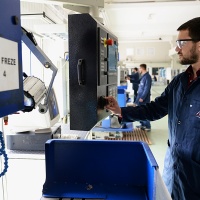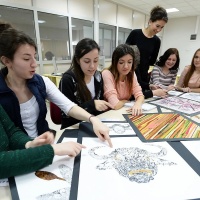
Automation Systems
PURPOSE
• To train our participants as Electrical-Electronics maintenance repairmen.
PROGRAM CONTENT
1. Detectors technique
2. Command and control of asynchronous motors with control circuit elements
3. Motor drivers
4. Project design with e-plan drawing program
5. Pneumatic -Electropneumatic systems
6. Hydraulic -Electro hydraulic systems
7. Basic PLC Systems
8. PLC Programming Techniques
9. Analog processing with PLC
10. Electropneumatic system control with PLC
11. Operator panels
12. Industrial Automation Systems Design
13. System Design and Application of Flexible Manufacturing Systems
METHOD
Programming, control, design operations will be conducted through Siemens PLC S7-1200.
Circuit design via Fluid-Sim Pneumatic-Hydraulic and Electropneumatic-Hydraulic Program
Application of circuit design with adhesive circuit symbols
Operator panel applications will be applied via WinCC flexible software.
Performing Motor Speed Control applications
PLC and Control materials and catalogues,
Presentation of industrial applications drawn up on computer as slide show and film screening
Performing the applications on the experimental sets with electropneumatic-hydraulic and pneumatic-hydraulic, PLC and Operator panels
Connecting the Automatic control circuits on the panel
At the end of the training, an applicable project work will be conducted dependent on the content of the course.
Participation in fair and business trips
WHO SHOULD PARTICIPATE
Preferably a graduate of at least Vocational High School (Electrical Electronics, Informatics, Machinery, Industrial Automation and Mechatronics Departments
Robot System Maintenance and Programmer
PURPOSE
• To train our participants as Robotic System Maintenance and Programmer.
PROGRAM CONTENT
| 1. Basic robot safety principle |
| 2. Basic Robot Training |
| 3. Welding Technology |
| 4. Basic Welding application |
| 5. Welding on Robots |
| 6. Writing a software with Robot |
| 7. Simulation with Robot Studio Program |
| 8. Robot Fault Care Search Training |
METHOD
| Programming, controlling and designing processes will be conducted over ABB IRB 1600 Robot. |
| Gas metal arc welding will be applied in Basic Welding applications. |
| Software writing application will be performed via Robot Studio Program. |
| Simulation Run application will be performed via Robot Studio Program. |
| The failure and maintenance procedures that occur in the field of robot application will be followed up. |
| The security principles used in the robots will be taught. |
| At the end of the training, an applicable project work will be conducted dependent on the content of the course. |
| Participation in fair and business trips |
WHO SHOULD PARTICIPATE
Preferably a graduate of at least Vocational High School (Electrical Electronics, Informatics, Machinery, Industrial Automation and Mechatronics Departments








